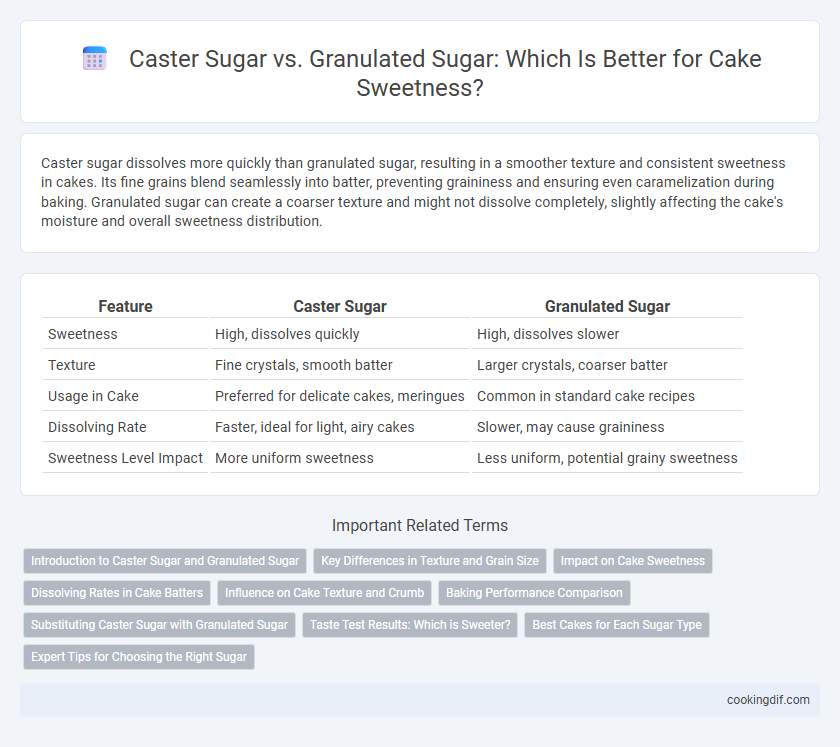Caster sugar dissolves more quickly than granulated sugar, resulting in a smoother texture and consistent sweetness in cakes. Its fine grains blend seamlessly into batter, preventing graininess and ensuring even caramelization during baking. Granulated sugar can create a coarser texture and might not dissolve completely, slightly affecting the cake's moisture and overall sweetness distribution.
Table of Comparison
| Feature | Caster Sugar | Granulated Sugar |
|---|---|---|
| Sweetness | High, dissolves quickly | High, dissolves slower |
| Texture | Fine crystals, smooth batter | Larger crystals, coarser batter |
| Usage in Cake | Preferred for delicate cakes, meringues | Common in standard cake recipes |
| Dissolving Rate | Faster, ideal for light, airy cakes | Slower, may cause graininess |
| Sweetness Level Impact | More uniform sweetness | Less uniform, potential grainy sweetness |
Introduction to Caster Sugar and Granulated Sugar
Caster sugar, also known as superfine sugar, has smaller crystals than granulated sugar, allowing it to dissolve more quickly and evenly in cake batters. Granulated sugar consists of larger crystals, which can provide a coarser texture and slower dissolution during baking. The choice between caster and granulated sugar impacts the cake's crumb and sweetness distribution, with caster sugar often preferred for lighter, more delicate cakes.
Key Differences in Texture and Grain Size
Caster sugar has a finer grain size compared to granulated sugar, allowing it to dissolve more quickly and evenly in cake batters. This finer texture results in a smoother crumb and more delicate sweetness distribution throughout the cake. In contrast, granulated sugar's coarser grains may create a slightly grainier texture and slower dissolution, potentially affecting the cake's overall tenderness.
Impact on Cake Sweetness
Caster sugar, with its finer texture, dissolves more quickly and evenly in cake batter, resulting in a smoother, more consistent sweetness throughout the cake. Granulated sugar, being coarser, may take longer to dissolve completely, potentially leading to uneven sweetness and a slightly grainy texture. The choice between caster and granulated sugar can significantly impact the overall sweetness perception and texture quality of the finished cake.
Dissolving Rates in Cake Batters
Caster sugar dissolves more rapidly than granulated sugar in cake batters due to its finer crystals, promoting a smoother texture and even sweetness distribution. Granulated sugar's larger crystals require more mixing and time to dissolve fully, which can sometimes result in a grainy texture or uneven sweetness in baked cakes. The faster dissolving rate of caster sugar enhances the batter's aeration and moisture retention, contributing to a tender crumb and consistent flavor profile.
Influence on Cake Texture and Crumb
Caster sugar dissolves more quickly than granulated sugar, resulting in a finer, more tender cake texture with an even crumb structure. Granulated sugar, due to its coarser crystals, can create a slightly coarser crumb and may produce a denser cake if not fully dissolved during mixing. The choice between caster and granulated sugar significantly influences the moisture retention and overall softness of the baked cake.
Baking Performance Comparison
Caster sugar dissolves more quickly than granulated sugar, creating a smoother batter that results in finer crumb texture and more even sweetness distribution in cakes. Granulated sugar, with larger crystals, can provide more aeration when creamed with butter, leading to a lighter cake structure but may leave a slightly grainier texture. The choice between caster and granulated sugar impacts not only sweetness intensity but also the cake's moisture retention and crumb consistency during baking.
Substituting Caster Sugar with Granulated Sugar
Granulated sugar can substitute caster sugar in cakes but may affect texture due to larger crystal size, resulting in a slightly coarser crumb. To approximate caster sugar, granulated sugar can be processed in a food processor for a finer consistency, enhancing dissolution and even sweetness distribution. Adjusting mixing time may be necessary to ensure the sugar fully integrates, maintaining desired cake sweetness and moisture.
Taste Test Results: Which is Sweeter?
Caster sugar dissolves more quickly than granulated sugar, resulting in a smoother texture and more evenly distributed sweetness in cakes. Taste tests reveal that cakes made with caster sugar are perceived as sweeter and more refined in flavor compared to those made with granulated sugar, which can sometimes leave a slightly grainy texture. The finer crystals of caster sugar enhance the overall sweetness profile, making it the preferred choice for delicate cake recipes.
Best Cakes for Each Sugar Type
Caster sugar's fine texture dissolves quickly, making it ideal for delicate cakes like sponge cakes and meringues that require a smooth, even crumb. Granulated sugar, with its larger crystals, provides better aeration and structure, perfect for denser cakes such as butter cakes and carrot cakes where texture and volume are key. Understanding the sugar type's effect on sweetness and texture helps bakers achieve the best results for each cake variety.
Expert Tips for Choosing the Right Sugar
Caster sugar dissolves more quickly than granulated sugar, resulting in a finer texture and smoother crumb in cakes. Experts recommend using caster sugar in recipes that require a delicate, light cake structure, such as sponge cakes and meringues, for optimal sweetness distribution. Granulated sugar, with its coarser crystals, is better suited for recipes needing extra structure or caramelization, like butter-based cakes or cookies.
Caster sugar vs Granulated sugar for cake sweetness Infographic

 cookingdif.com
cookingdif.com